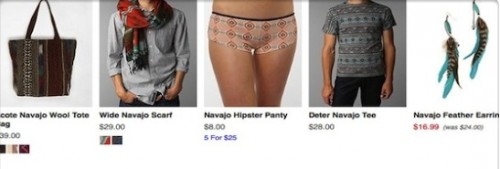Yesterday Native Appropriations featured a presentation about Urban Outfitters, cultural appropriation in fashion, and the struggle to get the clothing chain to stop labeling clothing as “Navajo.” The presentation is great both for explaining this particular case — which included the Navajo nation sending a cease-and-desist letter demanding that Urban Outfitters stop using the term Navajo in its marketing — and also because it shows how one particular story spread through social media, which increasingly have the ability to bring mainstream media attention to stories that otherwise might have gone unnoticed.


Comments 11
Tom Megginson — May 10, 2012
Not to detract from your excellent post, Gwen, but I can't help but think that "Navajo Hipster Panty" would be an awesome name for a band.
Anna — May 10, 2012
This is a very well-researched presentation that offers a lot of insight on how social media can bring awareness to a cause. But it is extremely biased and judgmental on the topic of cultural appropriation in fashion. Had it rested on the fact that appropriation of Navajo culture is actually illegal (which is very significant to this specific topic), that would be a strong argument. Ditto if it had it just focused on blatantly offensive, stereotyped items like the drinking flask.
Instead, the overall message of the presentation is that any and all forms of cultural appropriation of Native American culture in fashion are wrong, offensive, and harmful. It offered absolutely no other perspective, apart from one superficial quote by some Urban Outfitters honcho. Intelligent, thought-provoking analyses, as well as counter-arguments, of cultural appropriation do exist.
Cultural appropriation has occurred in fashion before the modern notion of fashion even existed. It has occurred in the arts and other disciplines since ancient times. It is arguably inevitable, and the way the appropriat-ing cultures as well as appropriat-ed cultures are affected is complex, to say the least. The subject of cultural appropriation - in fashion and otherwise - deserves to be discussed in a more nuanced way.
Adeba — May 10, 2012
hmmm. by my personal reckoning, approriation's hash was settled over 25 years ago by lesbians & other sentient beings-it's ridiculous to position this in the law, but I know someone has to since people with no honor only respond to threats to their wealth. I don't know what person with respect for creativity of any kind still shops at Urban Outfitters. They have a well-documented history ripping off small designers & craftspeople who try to sell their work on Etsy. Appropriation is way too subtle a notion for folks who steal at will. it's the venal and corrupt selling to the clueless and and cute. If there are millions of women who want .navaho' on their panties, Urban Outfitters is just another cynical player in a moral and intellectual wasteland.
David Chase Hawisher — May 10, 2012
I'm sorry, but simply pioneering a design doesn't mean you have exclusive claim to it. The Navajo and whoever else have no business getting all pissy over this.
Alex Odell — May 11, 2012
I can see people having a problem with fashion magazines glamorizing stereotypes of Native Americans (like Tyra Banks telling a Native American girl her Pocahontas photoshoot wasn't good because she didn't look 'tragic' and 'hippy' enough to make it look authentic), but I fail to see how just wearing a pattern could be offensive. If people like ponchos with Navajo patterns, how is that degrading to other Navajos?